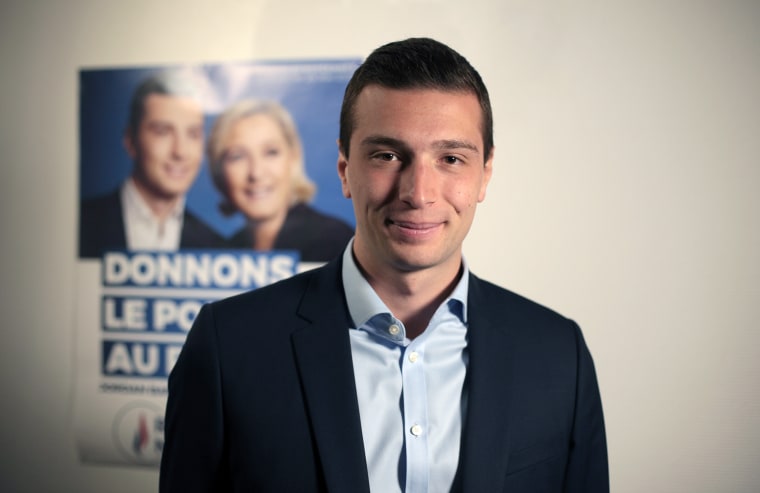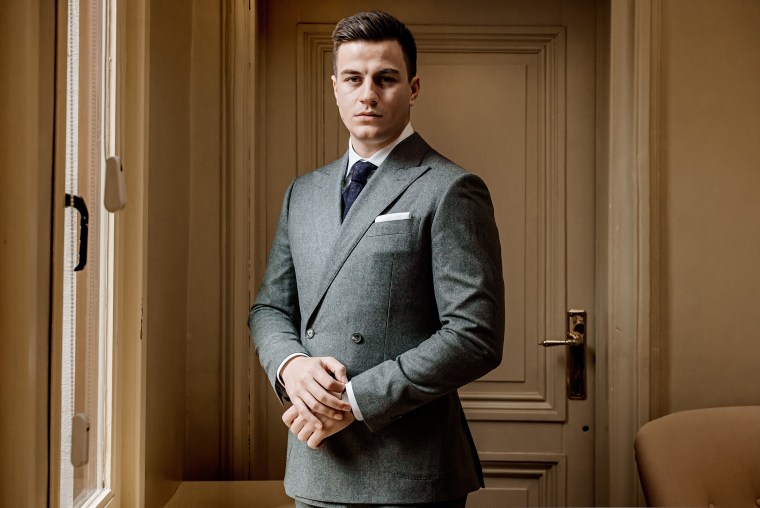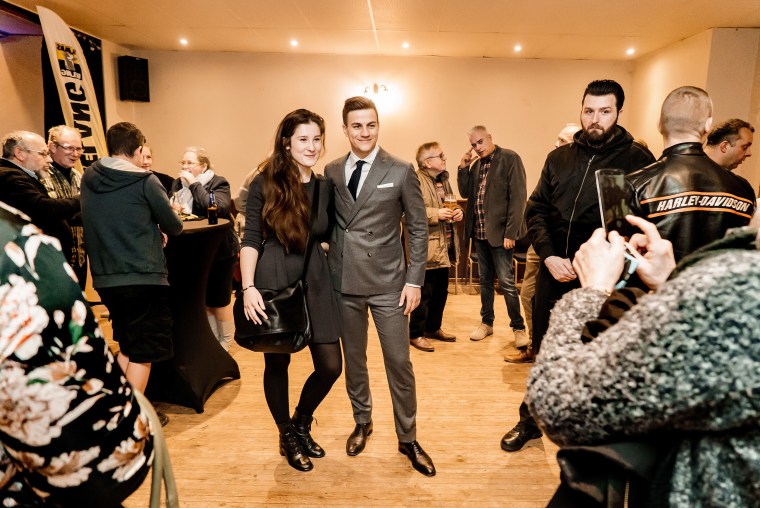MORMANT, France — The new darling of France’s far-right has a message for the European establishment: “We’re coming.”
Just 23, Jordan Bardella is the rising star of Marine Le Pen’s National Rally party — which was formerly known as the National Front.
Bardella is all but guaranteed to be elected to the European Parliament in elections beginning Thursday, where the National Rally is part of an alliance of nationalist parties that aims, as he says, to “upturn the table.”
United by their desire to stop migrants at Europe's external borders, "defend" European culture and identity and recover powers from the European Union for national governments, far-right lawmakers hope to transform the 28-country bloc from within. Youthful activists and candidates like Bardella are among the loudest voices clamoring for change.
"It is time to take back power, it is time to make us feel at home again," the former geography student told hundreds of supporters to rapturous applause during a recent rally outside Paris.
Extremists are expected to do well at the ballot box this week. Polls suggest the largest group of far-right parties is predicted to more than double its number of seats, with the far-right as a whole expected to control as much as 18 percent of Parliament, according to the European Council on Foreign Relations, a think tank. Such parties currently make up about 10 percent of the legislature, which makes laws that affect the daily lives of some 508 million people.
This predicted surge for the far-right as well as parties that are critical of the E.U. from both the right and the left represents a “blow” to the European establishment, according to Matthijs Rooduijn, a political sociologist at the University of Amsterdam.
The success of the far-right at the ballot box was described as an “earthquake” after the last election five years ago and such parties now appear poised to do even better, he said.
Polls also predict that the current "grand coalition" between center-right and center-left parties that have worked together to control the European Parliament since 1979 will lose its majority for the first time.
Pro-European Union forces represented by leaders such as German Chancellor Angela Merkel and French President Emmanuel Macron are embattled as they cling to their vision of how the bloc should work and what values it should stand for.

Since 2014, the unity of this club of nations has frayed. In 2015, more than a million asylum-seekers and migrants arrived at the borders of Europe, triggering a political crisis that has yet to be resolved. And a year later, Britain — one of the E.U.’s largest economies — voted to leave the bloc.
Lawmaker Guy Verhofstadt, who is the president of a pro-E.U. group in the Parliament, has framed the upcoming election as a “battle for Europe’s soul.”
A xenophobic reputation
Since taking over the party helm in 2011, Le Pen has tried to shake off the party’s reputation as xenophobic, anti-Semitic and consequently unelectable. The National Front was founded by her father, Jean-Marie Le Pen, who has been convicted on several occasions of contesting crimes against humanity or inciting racial hatred. He was expelled from the party in 2015 after repeating his view that the Holocaust was a "detail of history."
Marine Le Pen did win almost 11 million votes in France's 2017 presidential election — more than 1 in 3 of the total cast — but she still sees a need to rebrand the party.
The eloquent and clean-shaven Bardella, who was raised by a single-mother in a rough Paris suburb known for its large migrant population, fits in well with those efforts.
Bardella rejects the multicultural France he grew up in. “A multicultural society is especially and above all a multiconflictual society,” he told supporters who had gathered in an airy barn outside the rural town of Mormant.
In its manifesto, the National Rally calls for more controls at Europe’s borders as well as the reinstatement of national boundaries within the bloc.
Even though migration to Europe has fallen significantly in recent months, Bardella said France should take inspiration from Italy's anti-immigrant Interior Minister Matteo Salvini.
“The long-term effect might be the dismantling of the European Union in the way we know it now.”
Salvini tells migrants “don’t come here because we will not school your children, we will not make them legal, we won’t offer them free health care,” Bardella said, claiming that stopping immigration was possible.
When asked about his party’s stance toward Islam, Bardella said the party only has policies regarding Islamic fundamentalism.
“Today you have French people who are killed in the streets, who are stabbed, who died on the terrace of a café,” he said, referring to a series of terrorist attacks that have killed dozens of French civilians and scarred the national psyche.
Bardella described Islamic fundamentalism as "an ideology that has declared war on us."
'Importing terrorism and civil war'
In neighboring Belgium, scarred by its own terror attacks, another well-dressed millennial argues that mass immigration is “destroying social cohesion in Western Europe."
“We have our own problems. We have to stop importing problems from around the world and importing terrorism and civil war,” said Dries Van Langenhove, a top candidate for the far-right Flemish Interest party in the Belgian federal election that also takes place this week.

Van Langenhove — who has more than 33,000 followers on Instagram — spoke of tensions and violence among communities that include Turkish and Kurdish migrants, as well as Jewish people and Palestinians, but gave no concrete evidence to back up his claims.
Van Langenhove, 26, came to prominence as the founder and leader of Schild en Vrienden, a Flemish nationalist movement named after a historic battle cry.
He believes Flanders — the Dutch-speaking northern part of Belgium — should break away from the French-speaking Walloon region to form its own state.
The movement aims to bring an end to the “individualistic nihilistic society” in Flanders by encouraging the return of conservative “family values," Van Langenhove told NBC News. It also stands for freedom of speech and against political correctness, he added.
Experts say Schild en Vrienden was partly inspired by the American alt-right.
“They are very well dressed, very polite and friendly, but at the same time they are activists against left-leaning groups. They also attack the media and the traditional public broadcaster as a left-leaning group," said Peter Van Aelst, a political science professor at the University of Antwerp.
Last year, a documentary by the Belgian state broadcaster VRT accused members of Schild en Vrienden of spreading racist, anti-Semitic and misogynistic memes in secret online groups. Its members were also accused of Nazi glorification and promoting a culture of violence by posing with weapons and encouraging their followers to learn to use guns.

Bart Maddens, a professor of political science at the University of Leuven, said there were two points of view about Schild en Vrienden.
Some see the group as a “very extreme dangerous movement that are sort of preparing for civil war,” he said, while others believe it as "just typical of young people trying to provoke and to draw attention.”
When asked about the allegations made in the documentary, Van Langenhove said memes were often jokes and should not be taken literally. He also stressed the importance of freedom of expression.
He denied creating or spreading offensive material or encouraging violence. "I'm a member on Facebook of 4,400 groups," he added. "I don't know what has been posted in all of these groups and chats."
Van Langenhove said he did not believe memes encouraged or were responsible for actions in real life. Instead, he said that any anti-Muslim slurs should be seen as a reaction to mass migration — even if they are unjustifiable.
“That’s a consequence of the conflict that arises due to multiculturalism, that is a consequence of the hundreds of thousands of people who have been abused and killed by Muslims around the world,” he said.
'Make Europe Great Again'
Young far-right party members from across Europe rail against what they describe as the “unelected” European bureaucrats and technocrats who make decisions in Brussels. Instead they say they want to move toward a “Europe of nations” where national borders are reinstated and powers are returned, but countries can continue to cooperate on common issues.
At a recent meeting of young far-right party members from across the continent in Rome, delegates called on the overwhelmingly white, male crowd to "Make Europe Great Again" from within.
"We’re working for the Europe of tomorrow," said Davide Quadri, a representative of the youth wing of Salvini's anti-immigrant League party, which organized the event. "Before we destroy the home, we can try to change it."
Bardella agrees with that approach. "We're coming" is emblazoned upon his party's paraphernalia.
“We have the opportunity to arrive in force in front of the European Commission and to upturn the table,” Bardella added, referring to the E.U.'s executive body.
If polls are accurate, enough far-right politicians could be elected this week to potentially work together to slow down the legislative process, according Marta Lorimer, a doctoral candidate at the London School of Economics and Political Science who has written about the far-right in Europe.
Getting the other euroskeptic parties onside would mean that it could be a struggle to pass laws in the coming years, she added. This in turn could fuel more euroskepticism and support for far-right parties, she said, making it “a vicious circle.”
“The long-term effect might be the dismantling of the European Union in the way we know it now,” Lorimer added.


